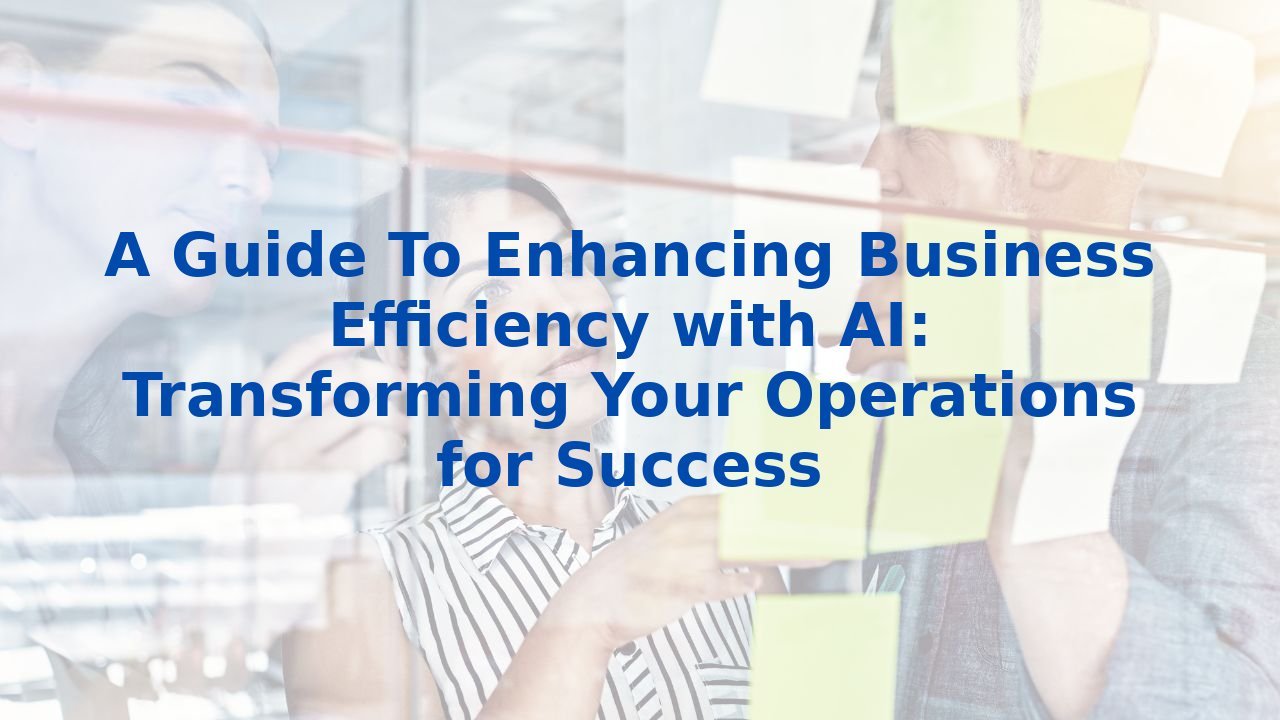A Guide To Enhancing Business Efficiency with AI: Transforming Your Operations for Success
A Guide To Enhancing Business Efficiency with AI: Transforming Your Operations for Success
In an era marked by rapid technological advancement, businesses are continually striving to sharpen their operational efficiency. With the integration of Artificial Intelligence (AI), organizations are transforming their workflows, automating processes, and ultimately discarding the shackles of outdated practices. Let’s explore how embracing AI can lead to a more efficient organizational structure, creating pathways for innovation and growth.
1. Automating Routine Tasks
Many businesses remain entangled in the monotony of routine tasks. Yet, AI's capacity to automate these repetitive functions can be a game changer. Imagine your employees freed from the drudgery of manually responding to customer inquiries or managing calendars.
AI-powered chatbots are redefining customer service by managing typical inquiries around the clock. This allows human representatives to tackle complex and nuanced issues, thereby enhancing overall service quality. Furthermore, automated systems in areas like accounting and project management streamline workflows. Such transformations do not just boost morale; they enhance productivity, allowing teams to divert energy toward strategic initiatives.
2. Data Analysis and Insights
The explosion of data in modern businesses can be daunting. However, AI excels in sifting through vast datasets, unearthing intricate patterns and insights that manual analysis might overlook. Harnessing this capability means organizations can make informed, data-backed decisions swiftly.
With AI's analysis of real-time data, leaders can not only react but also anticipate business shifts, ensuring agility in decision-making. The power of insight, once a tedious process, now becomes a seamless integration of research and real-time analytics. Imagine a scenario where critical business decisions are supported by data models rather than instinct alone—a significant leap toward operational excellence.
3. Enhancing Decision-Making
Decision-making in organizations can often be clouded by biases. AI presents an opportunity to enhance this by offering objective data analysis. By summarizing findings from employee feedback or customer responses, AI helps internal stakeholders focus on what truly matters.
Utilizing AI to distill insights ensures that decisions are made with clarity, therefore reducing the noise of subjective interpretation. This data-driven approach cultivates confidence among leaders, and that confidence radiates throughout the organization.
4. Improving Customer Experiences
In a world where customers demand personalization, AI serves as an indispensable tool. By analyzing customer behavior and preferences, AI can deliver tailored experiences that resonate on a personal level.
Imagine your clients receiving recommendations uniquely suited to their tastes based on previous interactions. This not only enhances customer satisfaction but cultivates loyalty. Investing in AI means investing in retention—building lasting relationships that transcend mere transactions.
5. Predictive Analytics
The future isn't just to be guessed; it can be forecasted. AI's predictive capabilities empower businesses to understand trends and demand patterns well ahead of time.
By analyzing historical data, organizations can fine-tune inventory management, optimize production schedules, and identify potential bottlenecks before they escalate. This proactive approach translates to minimized operational inefficiencies and maximized resource allocation—a win-win that conservatively trims costs while enhancing service delivery.
6. Enhancing Operational Efficiency
In addition to customer engagement, AI drives improvement in various operational areas. From optimizing supply chains to refining human resource processes, AI can manage logistics like demand forecasting, thus minimizing the risk of surplus or shortages.
Moreover, AI’s ability to analyze candidate data accelerates recruitment, allowing HR to devote time to fostering a vibrant workplace culture. With AI as a partner, operational efficiency is not just a goal; it’s a standard.
The Benefits of Training Your Employees for AI
Integrating AI into your business isn’t just about technology; it’s about people. Training employees to work with AI systems is essential for a seamless transition. Here’s why investing in employee training is paramount:
- Understanding AI Capabilities: Knowledge of AI’s potential allows employees to leverage these tools effectively, resulting in enhanced productivity and innovation.
- Data Interpretation: Employees trained to interpret AI insights can make better-informed decisions that align with organizational goals.
- Collaboration: Fostering a collaborative environment where human creativity and AI efficiency coexist can unlock unprecedented possibilities.
- Adaptability: As AI technologies evolve, equipping employees with the necessary skills keeps them and the organization ahead of the curve.
Conclusion
Embracing AI is no longer an optional strategy; it's a decisive step toward operational success. The benefits of automating routine tasks, enhancing decision-making, and personalizing customer experiences cannot be overstated. Moreover, investing in employee training fortifies and humanizes the integration process.
In this rapidly changing landscape, those who harness the power of AI and equip their workforce with the necessary skills will not only survive but thrive. The future is here—embrace it, and watch your organization ascend to new heights of efficiency and effectiveness.



